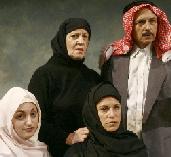SITE GUIDE
REVIEWS
FEATURES
NEWS
Etcetera and
Short Term Listings
LISTINGS
Broadway
Off-Broadway
NYC Restaurants
BOOKS and CDs
OTHER PLACES
Berkshires
London
California
DC
Philadelphia
Elsewhere
QUOTES
On TKTS
PLAYWRIGHTS' ALBUMS
LETTERS TO EDITOR
FILM
LINKS
MISCELLANEOUS
Free Updates
Masthead
Writing for Us
A CurtainUp Los Angeles Review
The Arab-Israeli Cookbook
By David Avery
|
This table is where I pray, and I've been praying a lot lately. ---Nadia, at her cooking table. |

Dorothy Constantine, Ismail Abou-El-Kanater, Dre Slaman, and Sarah Bell
(Photo: Brian Lowe/JPI Studios Intl.) |
Robin Soans' The Arab-Israeli Cookbook focuses not on the rights and wrongs of the situation, but on the everyday lives of the people living in it. The idea for the play was sparked during a trip to the Gaza Strip and the West Bank, where every debate Soans listened to tarted out rationally but quickly led accusation and counter accusation. He also observed that both Arabs and Israelis were passionate about food and that "if they were talking about food it would stop them getting propagandist." It is this passion that is the play's starting point.
The play is a collection of vignettes featuring thirty-five characters from all walks of modern Israeli and Palestinian life. Most of the dialog is taken directly from interviews conducted by the playwright. Hossin (Ismail Abou-El-Kanater) is a Palestinian hummus maker. Rose (Dorothy Constantine) and Abdullah (Louis R. Plante) are an older, inter-faith couple with an upwardly mobile daughter named Hala (Dre Slaman). Yaakov (Ric Borelli) drives a bus on one of the most dangerous routes in Jerusalem, and his wife Nina (Sarah Bell) worries about him. Three characters who resurface frequently are Nadia (Ros Gentle), a homemaker in Bethlehem; Fadi (Iman Nazemzadeh) a Palestinian student; and Rena (Jill Holden), a ex-Manhattanite now living in Jerusalem.
What all the characters have in common is a love of good food, and the careful attention to detail during its preparation. We get to listen to them talk about their lives, often as they create a special dish that must be made just so, be it as simple as crackers and hummus or as complex as stuffed vine leaves with chicken . The conceit is a good one, and believable.
The MET theater has a large stage space, which in this play for the most part is left unadorned. The props are s mostly of tables, chairs, and cooking implements. The scenes move along fairly quickly with a minimum of set manipulation. While most of the dialog is directed at the audience, director Louis Fantasia often has characters from the previous or next scene onstage, listening and reacting to those currently in the spotlight.. This creates an atmosphere of synchronicity across the scenes.
The actors all do an outstanding job of morphing rapidly from character to character and from scene to scene. The use of Nadia to bookend the play, and of Fadi and Rena (who nearly steals the show with her jaded New York view of the world) to connect scenes, turns what could be a jumbled collection of characters into a beautiful story collage.
What most amazes about this production is its lack of stridency. The language is calm, sedate almost which is in marked contrast to just about any current discussion of the Middle East. The audience is not being bombarded with slogans, propaganda, or points of view, but involved in a conversation. It's not that the play ignores the dangers its characters continually face -- for example, an unattended backpack causes an entire café to freeze in panic in one scene. But the moderate tone allows the audience to gauge the characters' passions. When those passions surface, the effect is striking. It's a far different focus than the sensational stories presented non-stop by the media.
It seems these days that everyone is very convinced of their moral high ground; God is on our side. As Nadia points out, "God's approval isn't going to change the hearts of people with earthly power." Eventually, in any conflict, people must focus on their similarities rather than their differences. The Arab-Israeli Cookbook posits that Arabs and Israelis (and perhaps Europeans and Americans) are very similar indeed.
| The Arab-Israeli Cookbook Playwright: Robin Soans Director: Louis Fantasia Cast: Ismail Abou-El-Kanater (Hossin, Old Man, Abdul, Liron, Naji), Sarah Bell (Assistant, Myra, Shoshi, Fattiyah, Nina), Ric Borelli (Customer, Alon, Aharon, Giore, Muhamad, Yaakov), Dorothy Constantine (Levana, Rose, Vitia, Neighbor), Ros Gentle (Nadia), Jill Holden (Rena, Julia), Iman Nazemzadeh (Fadi, Tim), Louis R. Plante (Mordechai, Abdullah, Arnon, David, Mounther), Dre Slaman (Elti, Hala, Ayman, Rivka, Amal), Amy Wieczorek (Understudy for Nadia) Settings: Robert Schulenberg Lighting: Leupold Costumes: Morrison Jackson Sound: Doug LeBow Music: Yuval Ron Running Time: Approximately 2 hours, 15 minutes (including a 15 minute intermission) Running Dates: 5/20/05 through 6/26/05 Times: Thursdays through Sundays @ 8pm, Sunday matinee @ 3pm The MET Theatre, 1089 N. Oxford Ave, Los Angeles, CA 90029 323-957-1152 www.thearab-israelicookbook-la.com Tickets: Thursdays $15, all other performances $20. There is a post performance discussion after Thursday shows. Reviewed by David Avery on 5/20/05. |

Easy-on-the budget super gift for yourself and your musical loving friends. Tons of gorgeous pictures.

Retold by Tina Packer of Shakespeare & Co.
Click image to buy.
Our Review

At This Theater

Leonard Maltin's 2005 Movie Guide

Ridiculous!The Theatrical Life & Times of Charles Ludlam

6, 500 Comparative Phrases including 800 Shakespearean Metaphors by CurtainUp's editor.
Click image to buy.
Go here for details and larger image.



